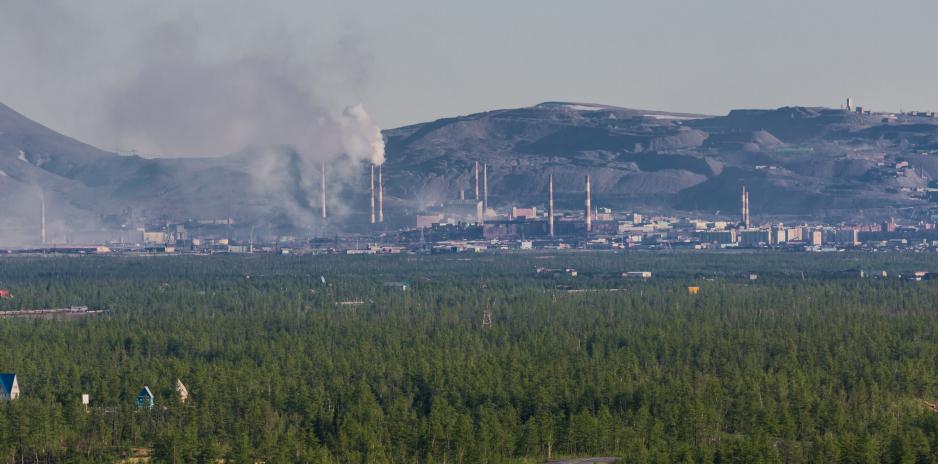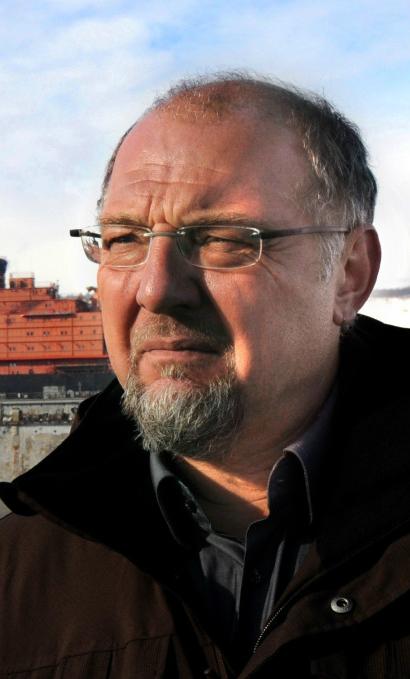Big Promises From a Big Polluter - Neighbors Hold Their Breath

Russia’s Norilsk Nickel mining company is touting its plans to dramatically reduce its air emissions. These modernization efforts cannot come soon enough for the mayor of a Norwegian town that lives downwind.
Norilsk Nickel is one of the world’s biggest nickel producers. The Russian mining company is also one of the Arctic’s biggest polluters, as Rune Rafaelsen is quick to note.
"When will you stop polluting your neighbor?"
He is the mayor of Kirkenes, a town in northeastern Norway that lies just a short distance from some of Norilsk Nickel’s operations on Russia’s Kola Peninsula. Kirkenes residents have long decried what they’ve described as “Soviet death clouds” emanating from the company’s operations and blowing across the border. The company releases more than 2 million tons of sulfur dioxide into the air each year. That includes more than 100,000 tons emitted near the Norwegian border.
Rafaelsen raised his ongoing concerns with the company’s emissions during a panel discussion on environmental issues at Russia’s recent Arctic conference held in Arkhangelsk. “I think we need an answer,” he said from the audience. "When will you stop polluting your neighbor?"
"We are cleaning up"
His question was aimed at Elena Bezdenezhnykh, one of Norilsk Nickel’s vice presidents, who had previously outlined her company’s efforts to curb its emissions. She offered Rafaelsen a brusque reply. While her company is continuing to work at cleaning up its operations, a pollution-free method of mining and smelting metal "doesn’t exist in the world," she said.
Earlier, Bezdenezhnykh had touted how Norilsk Nickel had spent more than $1 billion between 2014-16 to modernize its operations. This is part of a broader plan to spend 250 billion rubles ($4.4 billion) to dramatically reduce its emissions by 2023. These modernization plans are also expected to make the company more profitable by making its operations much more efficient.
Three times more than all Norway
But for Rafaelsen, the company’s boasts about its investments in cleaner technology need to be set against the context of the company’s billion-dollar profits, and the sheer scale of its pollution – he says the company emits three times as much sulfur dioxide as all of Norway.
Last year, the company shuttered its oldest nickel plant, located in the city of Norilsk in northwestern Siberia. As a result, the company reported that sulfur dioxide emissions in the area dropped by 35 percent, allowing residents to breathe noticeably easier.
The ground could be mined
With a permanent population of 175,000, Norilsk is the second-largest city within the Arctic Circle, after Murmansk. It’s also one of the most polluted cities in the world, according to a ranking that the Blacksmith Institute prepared a decade ago. Sodium dioxide expelled by the factories creates acid rain and smog, killing nearby plants and trees. The city’s factories have belched enough heavy metal particles into the air that the ground is considered contaminated enough to be commercially viable to be mined.
But one consequence of the Norilsk factory closing is that more metal is now being smelted on the Kola Peninsula, near Kirkenes. The company says it does plan to dramatically curb its emissions on the Kola Peninsula too, but details have yet to be released.
Closing down is not considered
One approach could be to simply shutter its operations at Nikel on the Kola Peninsula. This would no doubt please many residents of Kirkenes, but it would be a blow to thousands of workers in Nikel. In an interview with Arctic Deeply, Bezdenezhnykh said that closing Nikel’s plant isn’t currently being considered. Instead, the company is looking to perform major upgrades to Nikel’s production facility. Similar work is currently being explored at a smelter near Norilsk, where the Canadian firm SNC-Lavalin has been hired by Norilsk Nickel to devise the best way to capture sulfur dioxide emissions.
Norilsk Nickel has received several awards from Russian authorities in recent years in recognition of its efforts to clean up its emissions. But, given the amount of pollution the company still produces, the environmental group Bellona has mused whether these awards say more about the low bar that Russian resource extraction companies are expected to clear when it comes to environmental protection than anything else.
"It will never be enough"
In response, Bezdenezhnykh noted in an interview that WWF Russia recently published a report that ranked Russia’s mining companies in terms of their environmental records. It put Norilsk Nickel in fourth place out of 33 companies reviewed. She went on to say that for some critics, "no matter how much we invest in environmental protection, they would all insist that that is not enough."
Bezdenezhnykh also insists that Russia has stringent environmental rules. “For example, we do not have the right to dump into the water the liquids that contain higher additives than what you’d find in the drinking water.” This assertion, however, seems undercut by an incident in the autumn when a chemical spill caused a Siberian river to turn blood red. Norilsk Nickel was found to be responsible for the spill and was fined less than $1,000.
This article originally appeared on Arctic Deeply, and you can find the original here. For important news about Arctic geopolitics, economy, and ecology, you can sign up to the Arctic Deeply email list.
The author, John Thompson, is managing editor of Arctic Deeply. He has spent more than a decade working as a journalist in Canada’s north. He most recently served as the editor of the Yukon News in Whitehorse, and prior to that worked as a reporter for the newspaper. He also worked as a reporter and assistant editor for Nunatsiaq News in Iqaluit, Nunavut.

